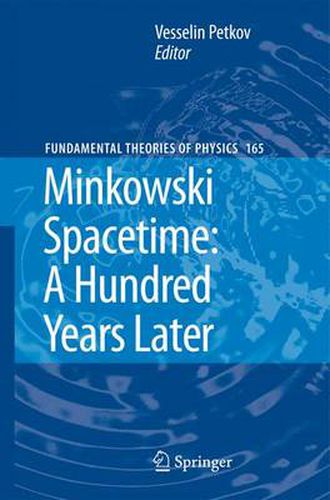Readings Newsletter
Become a Readings Member to make your shopping experience even easier.
Sign in or sign up for free!
You’re not far away from qualifying for FREE standard shipping within Australia
You’ve qualified for FREE standard shipping within Australia
The cart is loading…






This title is printed to order. This book may have been self-published. If so, we cannot guarantee the quality of the content. In the main most books will have gone through the editing process however some may not. We therefore suggest that you be aware of this before ordering this book. If in doubt check either the author or publisher’s details as we are unable to accept any returns unless they are faulty. Please contact us if you have any questions.
This volume is dedicated to the one hundredth anniversary of the publication of Hermann Minkowski’s paper Raum und Zeit in 1909 [1]. The paper presents the textofthetalkMinkowskigaveatthe80thMeetingoftheGermanNaturalScientists and Physicians in Cologne on September 21, 1908. Minkowski’s work on the spacetime representation of special relativity had a huge impact on the twentieth century physics, which can be best expressed by merely stating what is undeniable - that modern physics would be impossible wi- out the notion of spacetime. It is suf cient to mention as an example only the fact that general relativity would be impossible without this notion; Einstein succeeded to identifygravitywith the curvatureofspacetime onlywhen he overcamehis initial hostile reactionto Minkowski'sfour-dimensionalrepresentationof special relativity and adopted spacetime as the correct relativistic picture of the world. While there exists an unanimous consensus on the mathematical signi cance of spacetime for theoretical physics, for a hundred years there has been no consensus on the nature of spacetime itself. The rst sign of this continuing controversy was Sommerfeld’s remark in his notes on Minkowski’s article [2]: What will be the epistemologicalattitudetowardsMinkowski'sconceptionofthetime-spaceproblem is another question, but, as it seems to me, a question which does not essentially touch his physics .
$9.00 standard shipping within Australia
FREE standard shipping within Australia for orders over $100.00
Express & International shipping calculated at checkout
This title is printed to order. This book may have been self-published. If so, we cannot guarantee the quality of the content. In the main most books will have gone through the editing process however some may not. We therefore suggest that you be aware of this before ordering this book. If in doubt check either the author or publisher’s details as we are unable to accept any returns unless they are faulty. Please contact us if you have any questions.
This volume is dedicated to the one hundredth anniversary of the publication of Hermann Minkowski’s paper Raum und Zeit in 1909 [1]. The paper presents the textofthetalkMinkowskigaveatthe80thMeetingoftheGermanNaturalScientists and Physicians in Cologne on September 21, 1908. Minkowski’s work on the spacetime representation of special relativity had a huge impact on the twentieth century physics, which can be best expressed by merely stating what is undeniable - that modern physics would be impossible wi- out the notion of spacetime. It is suf cient to mention as an example only the fact that general relativity would be impossible without this notion; Einstein succeeded to identifygravitywith the curvatureofspacetime onlywhen he overcamehis initial hostile reactionto Minkowski'sfour-dimensionalrepresentationof special relativity and adopted spacetime as the correct relativistic picture of the world. While there exists an unanimous consensus on the mathematical signi cance of spacetime for theoretical physics, for a hundred years there has been no consensus on the nature of spacetime itself. The rst sign of this continuing controversy was Sommerfeld’s remark in his notes on Minkowski’s article [2]: What will be the epistemologicalattitudetowardsMinkowski'sconceptionofthetime-spaceproblem is another question, but, as it seems to me, a question which does not essentially touch his physics .